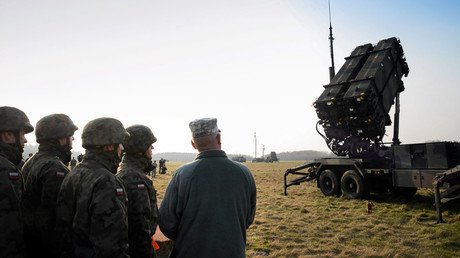‘Not aimed at Russia’: State Dept. contradicts Pentagon on US missile defense expansion goals
The US State Department has refused to admit Washington is seeking to boost its ballistic and cruise missile capabilities against perceived “Russian aggression” after the Pentagon clearly named Moscow as one of the threats that need to be contained.
Speaking before US lawmakers on Wednesday, Principal Deputy Under Secretary of Defense for Policy Brian McKeon said the US air defense system needs to be strengthened because Russia allegedly continues to violate the Intermediate-Range Nuclear Forces Treaty (INF).
“Russia is making significant investments in cruise missiles, including a cruise missile that violates the Intermediate-Range Nuclear Forces (INF) Treaty, which eliminated an entire class of US and Russian missiles nearly three decades ago,” McKeon told the Senate Armed Services Subcommittee.
To counter the alleged Russian threat, McKeon called for continued improvement of the Ground-based Midcourse Defense (GMD) system, in addition to modernizing Ground-Based Interceptors (GBI) and deploying new sensors.
The INF was a 1987 agreement between the United States and the Soviet Union aimed at eliminating nuclear and conventional ground-launched ballistic and cruise missiles with intermediate ranges between 500–5,500km. The treaty did not cover sea launched missiles.
Washington and Moscow have been trading accusations of violations of the INF Treaty for years now. Russia has repeatedly denied the accusations, but has hinted in the past that any decision to potentially pull out of the treaty would depend on US plans to boost its anti-missile capabilities in Europe. Washington in the meantime always insisted the missile defense shield along Russia’s border was intended to reduce the threat from Iran and North Korea.
The new initiative McKeon proposed seems to resurrect the idea of surrounding Russia with missile defense systems. However, asked by RT to clarify whether new Pentagon missile defense plans would indeed be aimed against Russia, the US State Department spokesman John Kirby said: “The air defense system in Europe ... is defensive in nature and it’s not aimed at Russia, not targeted at Russia. You can’t target a defensive system at anybody. And as for the systems and the initiatives that the Pentagon spoke to in that hearing, I would point you to them.”
Kirby's “not targeted at Russia” statement clearly contradicts McKeon’s when he said “we are developing and implementing a strategy to address Russian military actions that includes modifying and expanding air defense systems to deny Russia offensive capabilities.”
Washington is using the alleged Russian violations of the INF treaty as a pretext to launch the new Pentagon’s “defense” strategy. Those violations are allegedly explained in the Congressional report that was published the same day McKeon was making his plea to the Senate Armed Services Subcommittee.
In that report dated April 13, 2016, titled “Russian Compliance with the Intermediate Range Nuclear Forces (INF) Treaty: Background and Issues for Congress,” the authors point out the fact that Washington first “officially charged Russia” with violating the INF Treaty in late July 2014.
However, no specific examples of the violations were stated. The accusations by the US against Russia are as follows:
“The United States determined the cruise missile developed by the Russian Federation meets the INF Treaty definition of a ground-launched cruise missile with a range capability of 500km to 5,500km, and as such, all missiles of that type, and all launchers of the type used to launch such a missile, are prohibited under the provisions of the INF Treaty,” the report reads.
Washington did not provide any details about the missile or present any evidence that US officials were basing their accusations on. Even Wednesday’s congressional report acknowledges that during the bilateral discussions on the issue between Washington and Moscow, “Russia, for its part, complained that the United States did not offer any details to back up its accusations and, as it had in previous meetings, denied that it had violated the INF Treaty.”
According to the author of the congressional report Amy F. Woolf, specialist in nuclear weapons policy, Russia believes it is the US which is in violation of the INF treaty through a number of military programs: “The three programs identified by Russia include: (1) the use of intermediate-range missiles as targets during tests of US missile defense systems; (2) the use of drones as weapons delivery vehicles, and (3) the planned deployment of missile defense interceptors on land in the Navy’s MK-41 missile launchers.”















